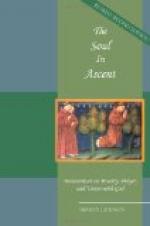Dr. Bushnell, in his lectures on Christian Nurture, has said that the formative years of every man’s life are the first three. Is he correct? I am not sure, but there can be no doubt but what with a good environment the consciousness of moral obligation will be very early developed.
The soul cannot long be imprisoned. The consciousness of “ought” and “ought not” will break all barriers as a growing seed will split a rock; and, when that stage of growth appears, the soul knows itself.
When the soul is finally awakened, when it realizes that it is indissolubly bound to a larger personality in the unseen sphere; when it finds that it is tied to other souls, and that it cannot escape from its responsibility for itself and them,—what then? Then the struggle of life begins. The awakening is to a realization of conflict with the seen and unseen environment, with forces within and fascinations without. When Paul speaks of the law as the minister of death, he simply means that law introduces an ideal, and ideals always start struggles. Law is something to be obeyed. It is sure to antagonize the animal in man. When our possibilities dawn upon us, in that moment there comes the feeling that they should be our masters. Then the lower nature resists and becomes clamorous. Duty calls in one direction and inclination impels in another. The period of ignorance has passed. Weakness and imperfection remain, but not ignorance. There is a conflict in the soul. The law in the members wars against the law in the mind. We feel that we ought to move upward, but unseen weights press heavily upon us, and to rise seems impossible.
Between God calling from above and animalism from below the poor soul has a hard time of it. The morally great in all ages have become strong by overcoming their fleshly natures. They have risen on their dead selves to higher things. The vision of God has reached them even in their prison-houses; and it has broken their chains and they have begun to move toward Him. To the end of the chapter they have had a long fight, and not seldom have been sadly worsted. Goethe and Augustine, Pascal and Coleridge, DeQuincey and Webster—how the list of those who have had to fight bitter battles for spiritual liberty might be extended I and many have not been victorious before the shadows have lengthened and the day closed. Should they be blamed or pitied? Pitied, surely, and for the rest let us leave them to Him who knoweth all things. “Vengeance is mine; I will repay, saith the Lord.” Men have nothing to do with judgment; the final word concerning any soul will be spoken only by Him whose vision is perfect. “Steep and craggy is the pathway of the gods,” and steep and craggy is the path by which men rise to spiritual heights.




